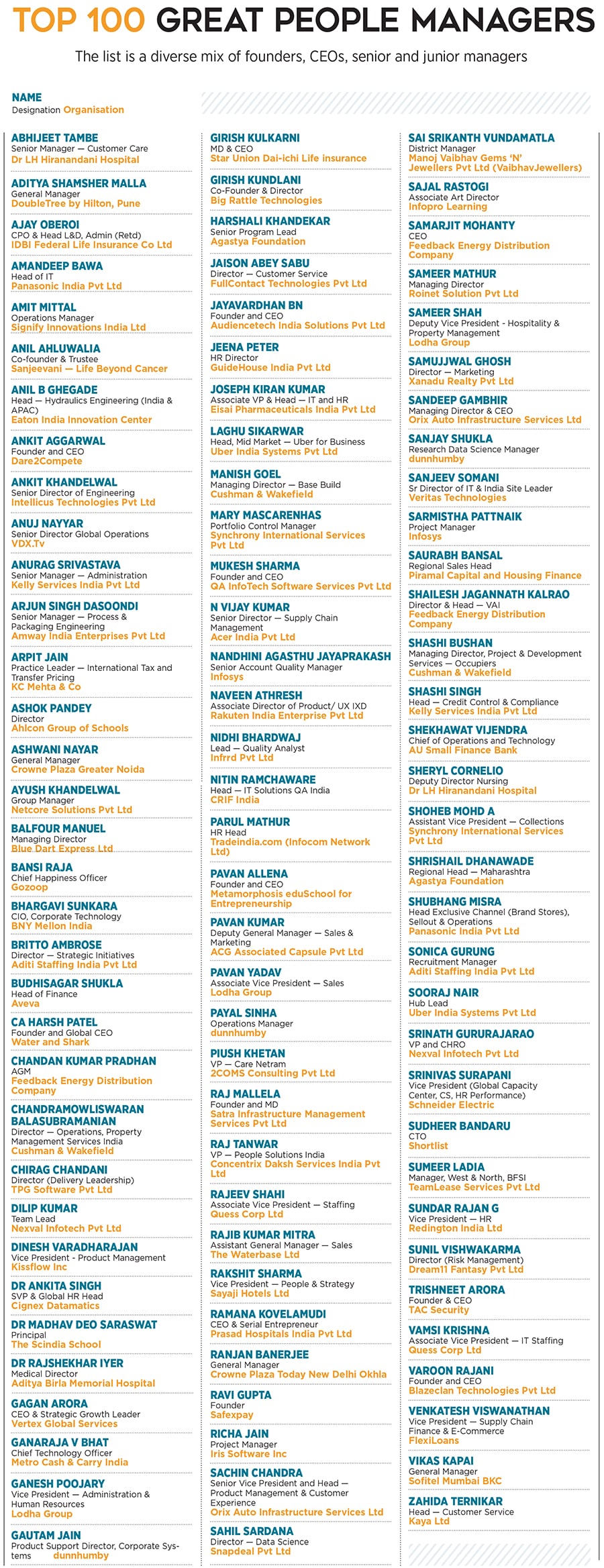
What sets great people managers apart?
Great Manager Institute annually conducts the Great People Manager Study, the largest study of its kind, in partnership with Forbes India, which culminates in the recognition of top 100 managers who show exemplary leadership of their teams
 Illustration: Sameer Pawar
Illustration: Sameer PawarPeople management has always been a challenging and dynamic proposition for managers. With rapid and radical changes in the workplace landscape, business continuity and sustainability are no more a concern for senior leadership alone. Factors such as decentralisation of power, flattening of organisational structures and the emergence of the ‘new normal’ of running virtual worksites makes the role of people managers even more critical in driving trust and high performance in teams.
Great Manager Institute annually conducts the Great People Manager Study, the largest study of its kind, in partnership with Forbes India, which culminates in the recognition of top 100 managers who show exemplary leadership of their teams.
This year, the study witnessed participation from 1,158 organisations spread across 24 industries and 6,344 managers were assessed.
Key insights from the study
Great people managers demonstrate varied and individualised styles. Some are mavericks in their approach towards managing teams, while some are more conventional; some leverage humour to tackle conflict; some use surprises to add some spice.
The common thread that runs across what they do is that they are authentic in building relationships of trust with their people. They think and act ahead of the curve. They use technology and digital tools to their advantage. It is no surprise that many of these managers have had a smooth transition to the new normal world, while leading teams for the same impact.
Great managers are great storytellers. They share their own experiences of both success and failure. Not having set agendas for catch-ups, they allow team members to express their opinions and ideas freely.
Great managers are great mentors to their teams. One of the winning managers has a simple mantra for her team – write down everything you learn at work. The team members vouch for this mantra and credit her for taking immense interest in their short- and long-term goals.
Our study tells us that career growth, development focus and guidance are three of the top five drivers of retention for employees. These are also the areas where great managers outperform their peers by a significant margin.
Who thinks about fun and celebration in the current times of crisis? Great managers do. One of the key differentiators of great managers is the ability to find reasons for celebration and happiness. They inspire their team members and create a sense of belonging and purpose for team members.
The top hundred managers list includes 85 men and 15 women. The practices of the women leaders who made the cut are great examples of thoughtfulness and inclusivity. The impact these women leaders bring to the business shows why India Inc needs to build a stronger resolve of increasing women participation in critical roles.
What’s in it for organisations and great managers? Many of the great managers see no or very low attrition in their teams. One of the winners, who has had no resignations in the team in the last five years, could grow sales by 6X in the same span. Great managers help people scale from being average performers to high performers and guide their people to deliver on key business indices sustainably.
Getting to often hear “Thank you, I could do this because of you” and “Thank you for having my back’, are some of the many perks great people managers enjoy.
The post-Covid era has paved a way for new digital workplaces. And yet, the role of managers as anchors and drivers of highly engaged and productive teams continues to stand. Great people managers, with their ability to connect, develop and inspire team members will continue to be a ray of hope for employees and organisations alike, building a path for a better tomorrow.
● Neelima Gulavani is business head and Dr Deepika Dabke is practice head at Great Manager Institute

Methodology
in its second year of the Great People Manager Study, Great Manager Institute followed a rigorous four-layer process to arrive at a list of the 100 best managers in the country.
A total of 1,158 organisations (up from 408 in 2019) participated this year and 6,344 managers were assessed. In all, 30,000-plus employees were covered under the study conducted over a period of one year.
While nationwide and industry-related insights were sought to understand people management styles, the final call was taken after weighing the responses from the participating managers and their teams.
The first layer comprised seeking feedback from employees about their reporting managers using an 18-statement survey that had a 1-5 rating scale. Qualitative insights were also sought through three open-ended statements. The survey is based on the framework—‘Connect, Develop, Inspire’ —a proprietary framework of Great Manager Institute.
Based on the team feedback from a minimum of three responses, about 25 percent of the managers moved to round two. In this step, managers were asked to share their best practices that have led to tangible and intangible impacts. An objective evaluation of the submitted practices was done in the areas of uniqueness, impact and all-inclusiveness.
The above-mentioned layers were also interspersed with automated and manual auditing to remove biased or ignorant responses.
The third step was an audit on the uniqueness of practices of managers with respect to other managers in their company and/or industry. This was followed by a final check with the organisation and a detailed reputation check.
The Top 100 Great People Managers list was arrived at after giving 67 percent weightage to the team feedback score and 33 percent to manager practices submitted by them. In the case of a tie-breaker, a technology-powered quantitative evaluation of comments was used. A limit of three managers per organisation was maintained to ensure people from different industries and companies make it to the list. Forbes India is the media partner and Suresh Surana & Associates LLP is the audit partner for the study.
(This story appears in the 30 November, -0001 issue of Forbes India. To visit our Archives, click here.)




